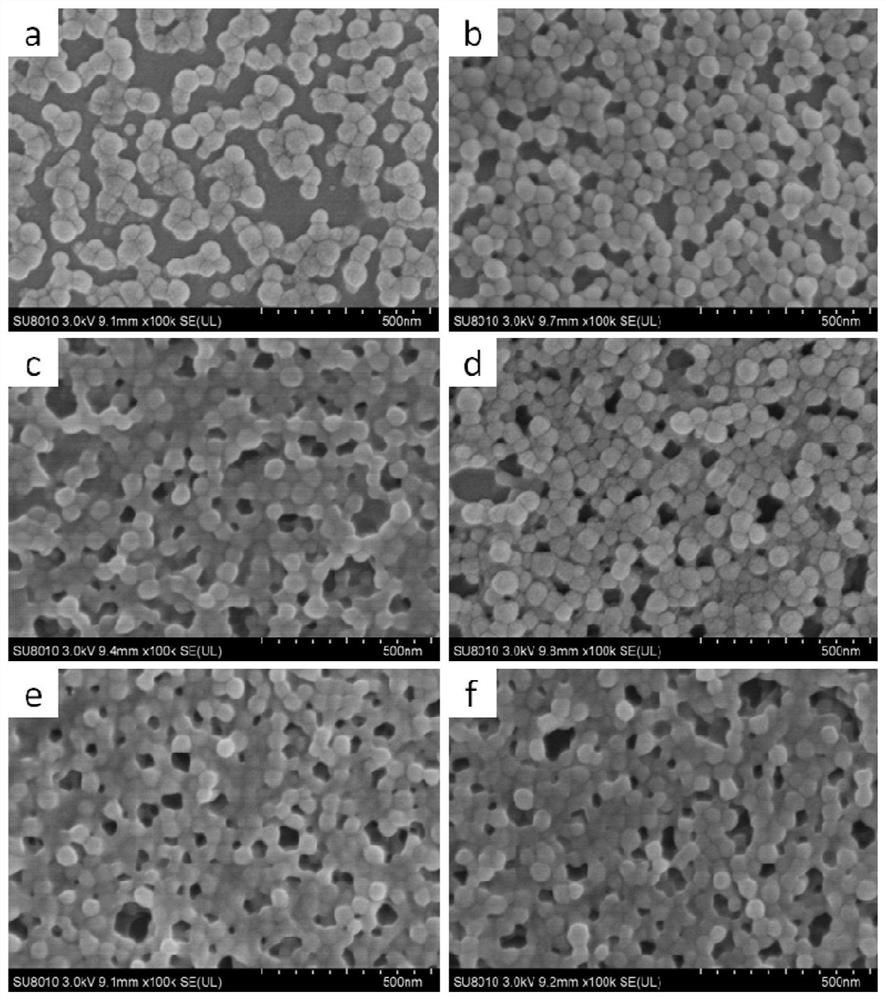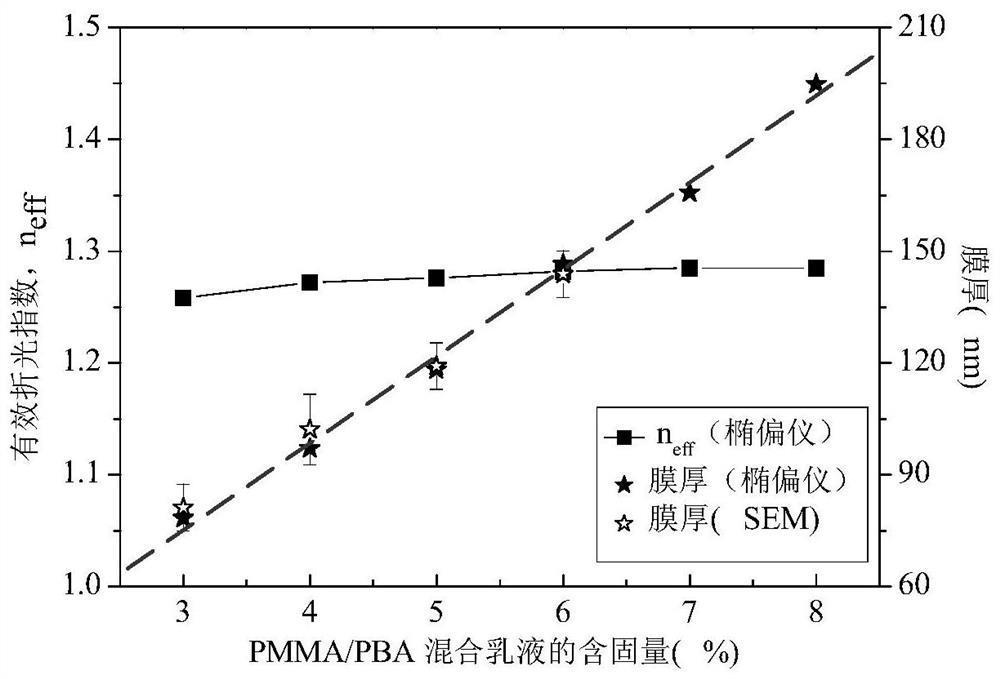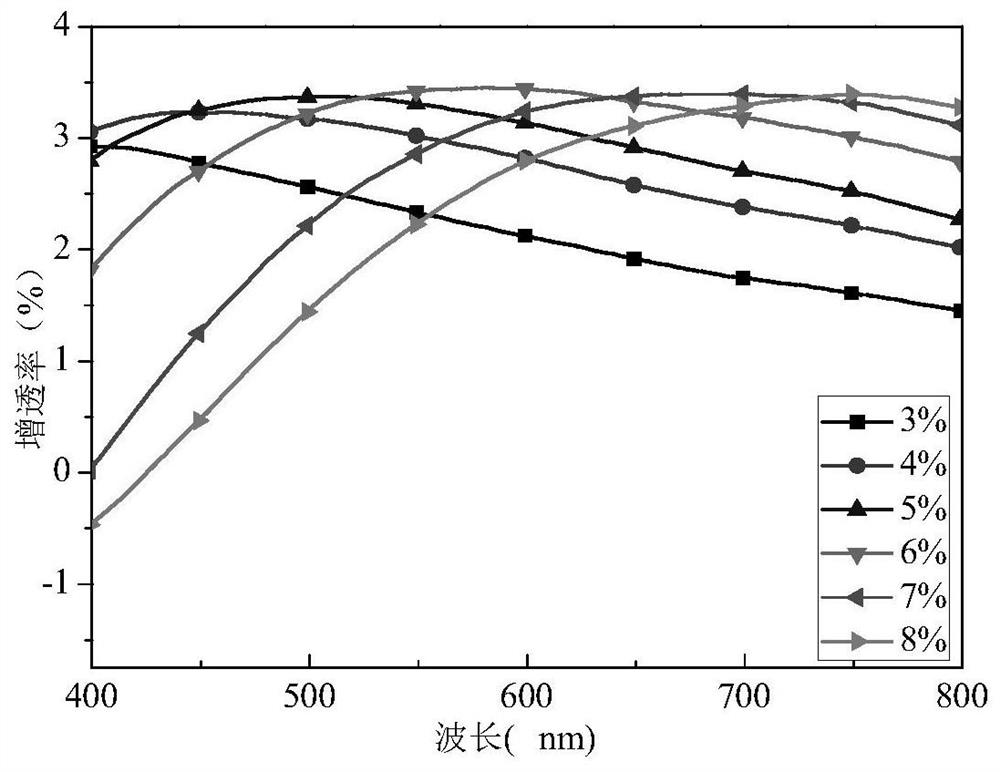Method for preparing nanoporous structure anti-reflection coating film on flexible substrate surface
A flexible substrate, nano-porous technology, applied in the coating and other directions, can solve the problems of low anti-reflection efficiency, inability to realize nano-porous structure, etc., to achieve the effect of increased anti-reflection efficiency, wide application range, and enhanced bonding force
- Summary
- Abstract
- Description
- Claims
- Application Information
AI Technical Summary
Problems solved by technology
Method used
Image
Examples
preparation example Construction
[0069] Preparation of cross-linked hard particles and soft particles
[0070] Preparation of cross-linked hard particles: Weigh 2 grams of EGDMA and 18 grams of MMA sequentially in a beaker using an analytical balance, and stir for 5 minutes with a magnetic stirrer to mix the mixed monomers evenly; weigh them sequentially in another beaker 1 gram of SDS and 74.94 grams of deionized water were stirred with a magnetic stirrer for 5 minutes; the above-mentioned raw materials were added to a 250mL four-necked flask with a stirring paddle, a condenser tube and a nitrogen protection device, and the stirring speed was kept at 200~300 rpm / minute, the four-necked flask was placed in a water bath at 75°C, and the temperature of the system was guaranteed to be about 75°C. Dissolve 0.06 grams of KPS in 5mL of deionized water, add it to the four-necked flask, and react for 3 hours; the resulting emulsion was PMMA emulsion with a particle size of 58nm, that is, the emulsion of hard partic...
Embodiment 1
[0077] 1) Take six 25 mL beakers, respectively numbered Ⅰ, Ⅱ, Ⅲ, Ⅳ, Ⅴ and Ⅵ; add 1.2 grams, 1.5 grams, 1.9 grams, 2.3 grams, 2.7 grams and 3.1 grams of hard Particle emulsion, then add 0.5 g of soft particle PBA emulsion and 0.025 g of SDS to each beaker to prepare a coating emulsion with a solid content of 3% to 8%;
[0078] 2) Take six 25mL beakers and mark them with No. 1, No. 2, No. 3, No. 4, No. 5 and No. 6 respectively. Add 0.15 g of NH4HCO3 to each beaker, and then add 5.5 g of NH4HCO3 to each of the above beakers. gram of deionized water; dissolve the NH4HCO3 in each beaker;
[0079] 3) Add the NH4HCO3 solution in No. 1 beaker to No. 1 beaker to obtain coating solution Ⅰ-1; add the NH4HCO3 solution in No. 2 beaker to No. 2 beaker to obtain coating solution Ⅱ-2; and so on, The coating liquids III-3, IV-4, V-5 and VI-6 were obtained respectively; in the process of adding the NH4HCO3 solution, it was required to drop slowly, and the emulsion was continuously stirred duri...
Embodiment 2
[0096] 1) Using the spin coating process, apply the coating solution VI-6 in Example 1 on the PET substrate, spin coating to form a film, and then place it in a blast oven at 80°C for 1 hour and take it out to obtain nano Anti-reflection coating with porous structure.
[0097] 2) The coated PET film was bent 180° multiple times, and the transmittance after bending was tested to investigate the mechanical stability of the coated film.
[0098] The planar topography figure of coating film on PET substrate in embodiment 2 is as Figure 9 Shown; PMMA / PBA mixed emulsion in embodiment 2 prepares the transmittance curve figure of coating film under different bending times as Figure 10 shown.
[0099] The scanning electron microscope on the surface of the coating film shows that the coating film coated on the PET substrate has a porous structure; the test of the optical properties of the coated glass shows that before bending, the transmittance of the PET substrate of the coating f...
PUM
| Property | Measurement | Unit |
|---|---|---|
| particle size | aaaaa | aaaaa |
| particle size | aaaaa | aaaaa |
| transmittivity | aaaaa | aaaaa |
Abstract
Description
Claims
Application Information
 Login to View More
Login to View More - R&D
- Intellectual Property
- Life Sciences
- Materials
- Tech Scout
- Unparalleled Data Quality
- Higher Quality Content
- 60% Fewer Hallucinations
Browse by: Latest US Patents, China's latest patents, Technical Efficacy Thesaurus, Application Domain, Technology Topic, Popular Technical Reports.
© 2025 PatSnap. All rights reserved.Legal|Privacy policy|Modern Slavery Act Transparency Statement|Sitemap|About US| Contact US: help@patsnap.com



